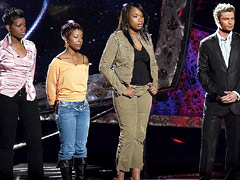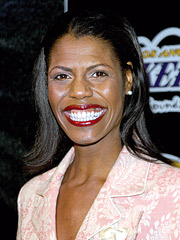The Reality of Race - For better or worse, says Ken Tucker, shows like ''American Idol'' and ''The Apprentice'' are proving that television isn't color-blind
In his great 1972 novel ''Mumbo Jumbo,''
Ishmael Reed created a comic fantasy history
of blacks in America with the concept of
''Jes Grew.'' The phrase (from slave girl
Topsy's comment in ''Uncle Tom's Cabin''
that she just ''growed'') is used by Reed
for the way an exciting, culture-altering
black sensibility permeated America. Reed
continues by saying that whites -- threatened
by a bold, original aesthetic -- were using
''a new invention Television to scan the
U.S. for Jes Grew activity.''
Well, with the April 21 ousting of Fox's ''American Idol'' contestant Jennifer Hudson, Jes Grew activity became more prominent in American minds. And paired with Kwame Jackson's second-place finish on NBC's ''The Apprentice'' the week before, due at least in part to sabotage by Omarosa Manigault-Stallworth, reality TV has officially become the nexus for that most fascinating, vexed, and charged American subject: race.
 In scripted television, black characters in particular are routinely rendered predictable. In sitcoms from ABC's ''My Wife and Kids'' to UPN's ''Half & Half,'' African Americans are sassy; they may make whites look unhip, but they're ultimately accepting of the suburban status quo. In dramas, writers are anxious not to offend: Heaven forbid they present any behavior that might be deemed ''negative.'' On reality TV, however, blacks can actively step out of their assigned media roles -- yet the result sometimes is that those roles are reinforced with a vengeance. In scripted television, black characters in particular are routinely rendered predictable. In sitcoms from ABC's ''My Wife and Kids'' to UPN's ''Half & Half,'' African Americans are sassy; they may make whites look unhip, but they're ultimately accepting of the suburban status quo. In dramas, writers are anxious not to offend: Heaven forbid they present any behavior that might be deemed ''negative.'' On reality TV, however, blacks can actively step out of their assigned media roles -- yet the result sometimes is that those roles are reinforced with a vengeance.
Nowhere else on TV but ''American Idol'' would you hear a black woman say, as Fantasia Barrino did, ''My lips are big, but my talent is bigger.'' Soon after, Fantasia's hometown newspaper wrote of the High Point, N.C., native -- a single mom and daughter of a truck driver and a minister -- that her ''big lips and sassy personality have sparked a racially tinged national fight between 'Idol' fans who love her or hate her.'' On the one hand, Fantasia's look, her aggressive response to Simon Cowell's criticisms, and her churchified vocal attack render her the candidate who has, as George Clinton would say, ''the funk.'' At the same time, is it a coincidence that the week after her baby was shown on camera, the singer was among the bottom three vote getters? Internet message boards reveal a quick-rising ugliness with comments like ''She is not married to the father of the baby.... Loose living is not what the American Idol should represent.'' Stereotypical reflexes are exposed with more immediacy in the reality TV arena, and not just among its viewers; the ''Idol'' judges lavished praise on Hudson's appearance the week she had her hair straightened (as they did when season 2's Kimberley Locke got a similar makeover).
 Similarly, only on ''The Apprentice'' would a black woman be shown to be as cavalierly duplicitous as Omarosa was to her team leader Kwame in the climactic final competition. I don't doubt that Kwame truly did not know he had the power to fire Omarosa (one crucial reason Trump gave for choosing Bill Rancic): Harvard biz school grad or not, young black professionals are not bequeathed the ''rule book'' that white businessmen operate by via generations of example and privilege. Why did Kwame pick Omarosa for his team? I think he was being, to use W.E.B. Du Bois' phrase, a race man -- that is, Kwame felt some responsibility to pick Omarosa, knowing that he might ultimately impress Mr. Trump if he could handle her ''diva'' devilishness. You also have to wonder how these TV decks are stacked. Do the producers of reality shows choose (consciously or unconsciously) some black contestants -- think ''Survivor'''s Alicia and Osten -- who initially appear friendly and competitive but eventually show their ''true colors'' and either explode or collapse under pressure? Similarly, only on ''The Apprentice'' would a black woman be shown to be as cavalierly duplicitous as Omarosa was to her team leader Kwame in the climactic final competition. I don't doubt that Kwame truly did not know he had the power to fire Omarosa (one crucial reason Trump gave for choosing Bill Rancic): Harvard biz school grad or not, young black professionals are not bequeathed the ''rule book'' that white businessmen operate by via generations of example and privilege. Why did Kwame pick Omarosa for his team? I think he was being, to use W.E.B. Du Bois' phrase, a race man -- that is, Kwame felt some responsibility to pick Omarosa, knowing that he might ultimately impress Mr. Trump if he could handle her ''diva'' devilishness. You also have to wonder how these TV decks are stacked. Do the producers of reality shows choose (consciously or unconsciously) some black contestants -- think ''Survivor'''s Alicia and Osten -- who initially appear friendly and competitive but eventually show their ''true colors'' and either explode or collapse under pressure?
I've heard the message-board arguments: It's not race -- Ruben won last season! It's not race -- teen white girls, a huge segment of the ''Idol'' audience, just think the ghost-voiced John Stevens is a cutie-pie! Well, maybe. But ultimately, race does matter, whether we're analyzing musical technique or cultural preconceptions. To quote Mumbo Jumbo again: ''This is the country where something is successful in direct proportion to how it's put over; how it's gamed.'' Some see this as troubling; I think we should see it as a new, unexpected opportunity in a genre itself too often disrespected. The medium usually buries these sensitive issues, so I find reality TV's raising of the subject potentially thrilling. It's time we Jes Grew up.
-EW.com |